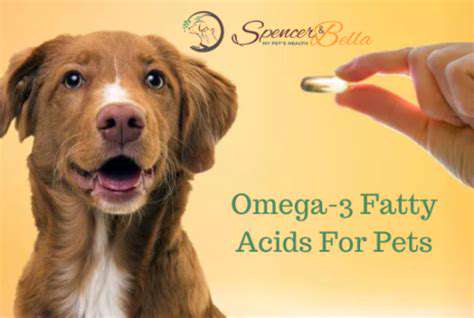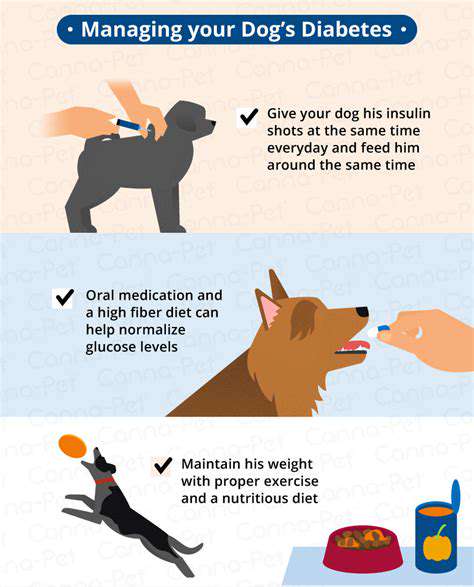Omega 3s for Pets: Benefits for Skin and Coat
Omega-3s: Essential Fatty Acids for Healthy Skin and Coat
Omega-3 fatty acids are crucial for maintaining the health and integrity of a pet's skin and coat. They are essential nutrients that our pets cannot produce on their own, making dietary intake vital. These polyunsaturated fats play a key role in various physiological processes, including skin cell turnover, reducing inflammation, and promoting healthy sebum production, which contributes to a shiny, smooth coat and a healthy skin barrier.
A diet rich in omega-3s can significantly impact the overall appearance and well-being of your pet's skin and coat. Improved texture, reduced dryness, and a significant decrease in issues like itching and flakiness are often observed in pets supplementing their diet with adequate omega-3 fatty acids.
The Role of Omega-3s in Reducing Inflammation
Inflammation is a common culprit behind skin and coat problems in pets. Omega-3 fatty acids have potent anti-inflammatory properties, helping to reduce redness, itching, and flakiness. By modulating the inflammatory response, omega-3s can alleviate discomfort and contribute to a healthier, more comfortable environment for your pet's skin.
Chronic inflammation can lead to a range of skin conditions, from mild dryness to more severe issues like eczema. Omega-3s can support the body's natural ability to manage inflammation, helping to prevent these conditions and promote overall skin health. This reduction in inflammation translates to a significant improvement in your pet's quality of life.
Sources of Omega-3s for Pets
Omega-3 fatty acids can be obtained through various dietary sources for pets. Fish oil supplements are a common and effective way to boost omega-3 intake. Look for high-quality fish oil supplements specifically formulated for pets, as different formulations vary in concentration and quality.
Certain fish, such as salmon and mackerel, are excellent natural sources of omega-3s. However, incorporating these directly into a pet's diet might not always be practical or balanced. A balanced diet that includes these fish-based products or supplements can help ensure your pet receives the necessary omega-3s for optimal skin and coat health. This is especially important for dogs and cats with existing skin conditions.
Omega-3s and Coat Shine: A Visible Difference
A healthy, shiny coat is a visible sign of overall well-being in pets. Omega-3 fatty acids play a crucial role in maintaining a lustrous coat. They support sebum production, a natural oil that keeps the skin and coat moisturized and healthy. This leads to a healthier, shinier coat that reflects light, offering a more vibrant appearance.
Omega-3s and Skin Barrier Function
A strong skin barrier is essential for protecting pets from environmental irritants and allergens. Omega-3s support the integrity of this barrier, preventing moisture loss and reducing the risk of skin infections. Their role in maintaining the skin's natural protective function is vital for overall skin and coat health, contributing to a more resilient and healthy skin barrier that protects against external factors.
By maintaining a strong skin barrier, omega-3s help prevent dryness, flakiness, and other skin problems that can make your pet uncomfortable. This is especially important for pets with pre-existing skin conditions.
Many people underestimate the physical toll that addiction takes on the body. Beyond the obvious symptoms like fatigue and loss of appetite, a range of less noticeable issues can arise. These issues can significantly impact overall health and well-being, often leading to a vicious cycle of discomfort and discouragement. Chronic sleep deprivation, for example, can contribute to a weakened immune system, making individuals more susceptible to illness.
Choosing the Right Omega-3 Supplement for Your Pet

Understanding Omega-3 Fatty Acids
Omega-3 fatty acids are essential polyunsaturated fats that our bodies need for various functions, yet cannot produce on their own. They are crucial for maintaining healthy cell membranes, supporting brain function, and promoting cardiovascular health. These vital nutrients play a significant role in reducing inflammation throughout the body, which is linked to a multitude of health conditions.
A deficiency in omega-3s can lead to various health issues, including impaired cognitive function, increased risk of heart disease, and weakened immune response. Understanding the importance of omega-3s and their various benefits is crucial for making informed decisions about supplementation.
Different Types of Omega-3 Supplements
Several types of omega-3 supplements are available, each derived from different sources. Fish oil supplements, derived from fatty fish like salmon and tuna, are a common and widely recognized source of EPA (eicosapentaenoic acid) and DHA (docosahexaenoic acid), two crucial omega-3s that offer numerous health benefits. These supplements are often recommended for their high concentration of EPA and DHA.
Algae-based omega-3 supplements are another alternative. They provide a plant-based source of EPA and DHA, making them suitable for individuals with dietary restrictions or concerns about consuming animal products. These supplements can be just as effective as fish oil in providing these essential fatty acids, offering a more sustainable and potentially environmentally friendly option.
Other sources of omega-3s include flaxseed oil and chia seeds, which contain ALA (alpha-linolenic acid), another type of omega-3 fatty acid. However, the body's conversion of ALA to EPA and DHA is inefficient, meaning that these sources may not provide the same levels of EPA and DHA as fish oil or algae-based supplements.
Choosing the Right Omega-3 Supplement for You
When selecting an omega-3 supplement, it's essential to consider factors like the source, concentration of EPA and DHA, and overall quality. Different individuals may have different needs, depending on their health status and dietary habits. For example, individuals with cardiovascular concerns might benefit from a supplement with a higher concentration of EPA and DHA.
Consider consulting with a healthcare professional or registered dietitian to determine the appropriate dosage and type of omega-3 supplement that best suits your specific needs and health goals. They can provide personalized recommendations based on your individual circumstances and medical history. They can also help you understand potential interactions with other medications or supplements you may be taking.
It's also vital to choose a reputable brand that ensures quality and purity. Reading reviews and researching the supplement's manufacturing process can help you make informed decisions.
Read more about Omega 3s for Pets: Benefits for Skin and Coat
Hot Recommendations
- Best Pet Bowls: Stainless Steel and Ceramic
- Pet Hydration: Why It's Crucial
- Stop Counter Surfing: Training Your Dog to Stay Off
- Pet Hypothyroidism: Symptoms and Management
- Signs of Pet Liver Disease: What to Watch For
- Pet Emergency Kits: What to Pack
- Dangers of Xylitol: Toxic to Dogs
- Dealing with Pet Diarrhea: When to See a Vet
- Preparing Pets for Travel: Tips for a Smooth Trip
- Pet Depression: Recognizing the Signs











